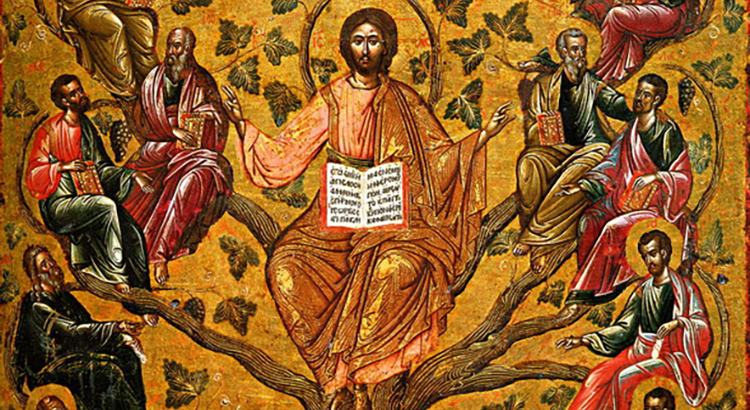Memory of the apostles
Feast of the apostles Philip and James.
Reading of the Word of God
Alleluia, alleluia, alleluia
If we die with him, we shall live with him,
if with him we endure, with him we shall reign.
Alleluia, alleluia, alleluia
1 Corinthians 15,1-8
I want to make quite clear to you, brothers, what the message of the gospel that I preached to you is; you accepted it and took your stand on it, and you are saved by it, if you keep to the message I preached to you; otherwise your coming to believe was in vain. The tradition I handed on to you in the first place, a tradition which I had myself received, was that Christ died for our sins, in accordance with the scriptures, and that he was buried; and that on the third day, he was raised to life, in accordance with the scriptures; and that he appeared to Cephas; and later to the Twelve; and next he appeared to more than five hundred of the brothers at the same time, most of whom are still with us, though some have fallen asleep; then he appeared to James, and then to all the apostles. Last of all he appeared to me too, as though I was a child born abnormally.
Alleluia, alleluia, alleluia
If we die with him, we shall live with him,
if with him we endure, with him we shall reign.
Alleluia, alleluia, alleluia
Today the Church remembers the Apostles Philip and James, and Paul, writing to the Corinthians, recalls that the risen Jesus "appeared to James, then to all the Apostles." From Easter and the appearances of the Risen One, begins that preaching of the Gospel that is transmitted from generation to generation. Paul remembers passing on to the Corinthians the same Gospel that he himself had received. Between this reception and the communication of the Easter Resurrection lies the heart of the Gospel and the secret of the Christian life. The apostles Philip and James are remembered by tradition as generous disciples who were among the first to respond to Jesus' call. Philip was a Galilean from Bethsaida, a fisherman like Peter. It was he who enthusiastically called Nathanael-Bartholomew. And it will be he who will bring to Jesus the question of those Greeks who wanted to see him in Jerusalem (Jn 12:20-22). In particular, the Gospel of John shows him to us as a missionary who questions and is questioned by the people who want to see Jesus. Tradition has him evangelising Asia and Phrygia, where he will die a martyr. James, on the other hand, also called the "Lesser" so as not to confuse him with the other James, brother of John, son of Zebedee, will die a martyr in Jerusalem in 62, among the first to give his life for the Gospel. "If Christ has not been raised, your faith is futile." Paul names the eyewitnesses: those to whom the risen Jesus appeared, even adding "more than five hundred brothers and sisters" most of whom, Paul says, were still living in his day. We too, who may consider ourselves the last of this long chain of witnesses of the Resurrection, are called to immerse ourselves in this testimony of faith and love. People believe in the resurrection not by our words, but by our lives. And the risen body of Christ today is in the members of his disciples, those members that we are also, living his love in this world.
